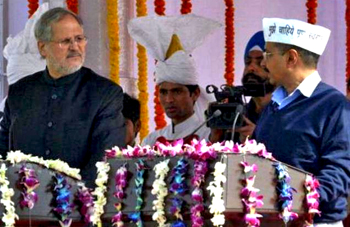New Delhi, May 28: The AAP government on Thursday moved the Delhi High Court challenging the Centre’s recent notification giving the Lieutenant Governor absolute powers in appointing bureaucrats in the national capital.

“As per the notification, the LG would have jurisdiction over matters connected with services, public orders, police and land, and...services of bureaucrats...allowing him discretionary powers to seek the opinion of the CM,” it said.
The petition was mentioned by Delhi government standing counsel Raman Duggal a day after the Centre moved the Supreme Court challenging an order of the Delhi HC which termed as “suspect” MHA’s recent notification barring the city government’s Anti-Corruption Branch (ACB) from acting against its officers in criminal offences.
The HC had also held that the LG cannot act in his discretion.
Mr. Duggal also said that he has challenged all notifications issued by the Centre in the past. The bench has listed the matter for hearing on Friday.
The Delhi government, led by the Chief Minister Arvind Kejriwal, has also challenged the appointment of Shakuntala Gamlin as acting Chief Secretary by the LG.
LG meets Union Home Secretary
Meanwhile, Delhi LG Najeeb Jung met Union Home Secretary L.C. Goyal on Thursday, amidst the ongoing tussle between him and the AAP government.
The meeting came a day after the Delhi Assembly passed a resolution rejecting the Home Ministry notification giving absolute powers to the LG in several matters, including transfer and postings of senior bureaucrats.
After the meeting with the Home Secretary, the LG refused to speak to media persons.
Sources said they discussed the issue of Wednesday’s resolution passed by the Delhi Assembly and the government’s stand in the apex court with regard to the SLP.





Comments
Add new comment